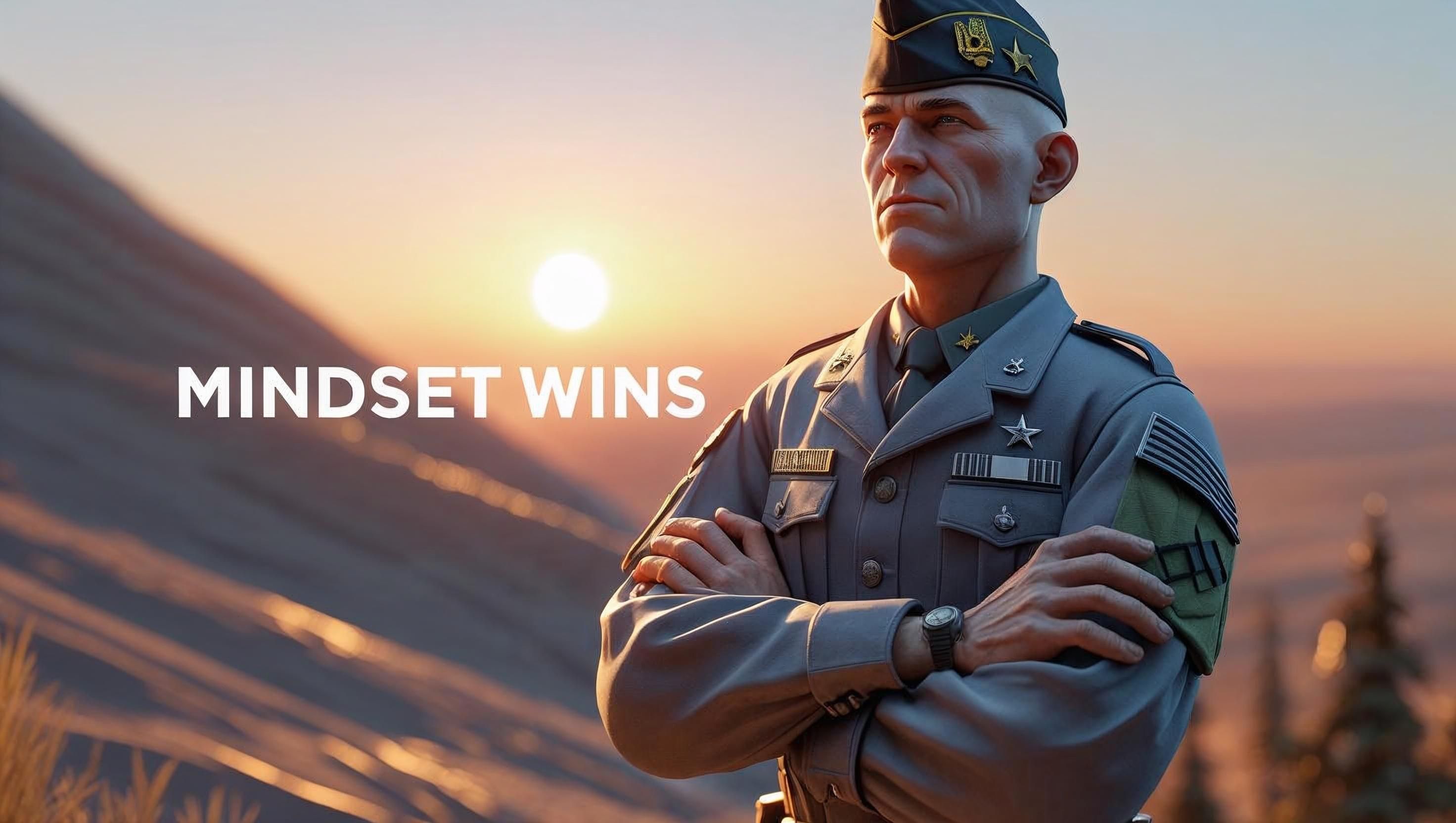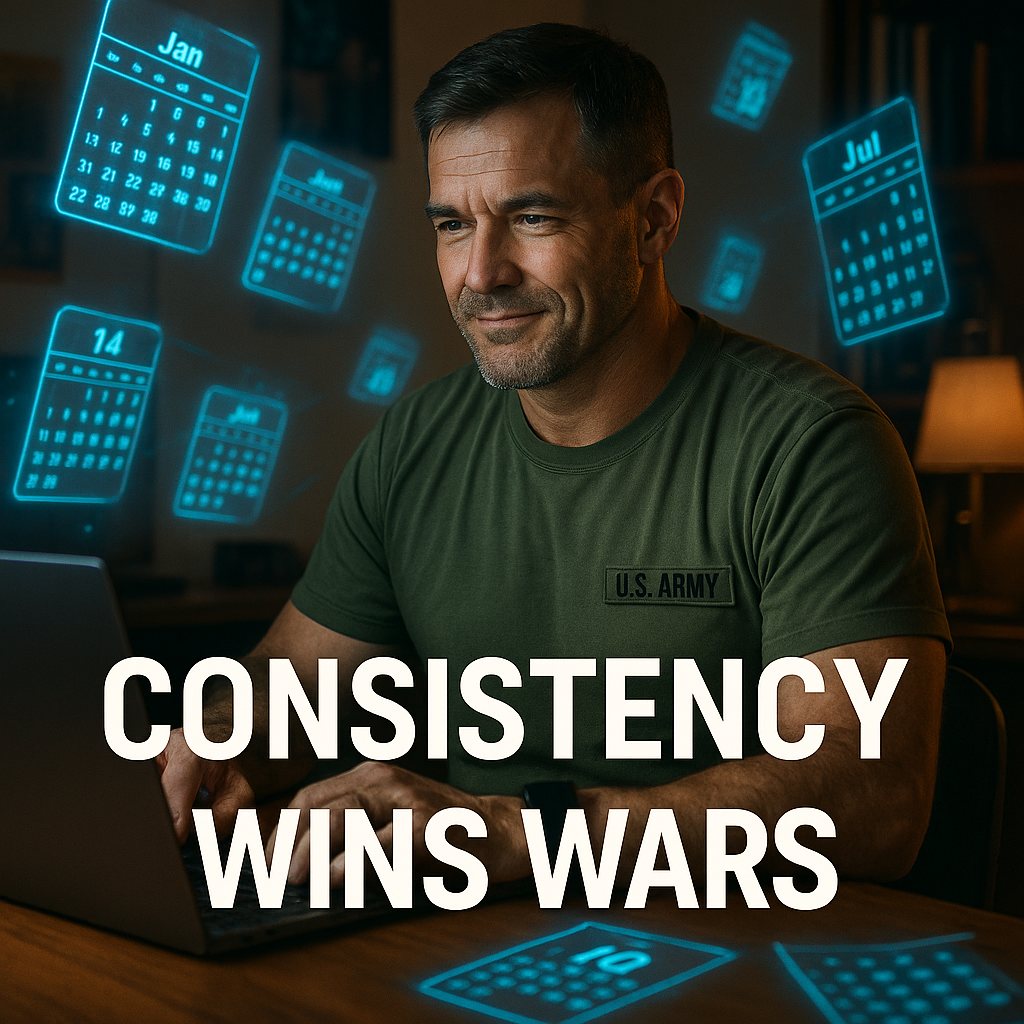Confession: I used to think success came down to connections, capital, or maybe pure luck. But after trading fatigues for spreadsheets, I realized all the tactical gear in the world means nothing if you can’t master your own mentality. In warzones and in startup life, what’s between your ears is often what determines if you advance or retreat. So pull up a chair—let’s uncover why veteran mindset isn’t just a cliché, it’s a business advantage hiding in plain sight.
Off the Battlefield, Into the Boardroom: What Actually Transfers?
When I first traded my boots for business shoes, I wondered: Which military skills for business would actually matter? Not every camo skill converts to commerce, but I quickly learned that mental resilience, discipline, and adaptability are the real game-changers. These are the core veteran mindset in business that set us apart.
Discipline: The Backbone of Business Planning
Military vets’ leadership skills are forged in routine and repetition. In the service, discipline isn’t just about following orders—it’s about showing up, even when you’re exhausted, and pushing through. In business, that same discipline fuels consistent business planning, meeting deadlines, and holding yourself (and your team) accountable. When others lose steam, we keep moving. That’s not just a memory from the field—it’s a daily advantage.
Mental Resilience: Turning Setbacks Into Strategy
Veterans already have mental toughness in our DNA. We’ve faced uncertainty, operated under pressure, and pushed through exhaustion. These aren’t just memories—they’re skills you can bring into your business journey. I remember after a rough product launch, I gathered my team for a “mission debrief.” We broke down what went wrong, what surprised us, and—most importantly—what we’d do differently next time. We kept it honest, and yes, we laughed at our own mistakes. That habit, straight from military after-action reviews, made us stronger and more united. Surprisingly, even after-action reports can become your most valuable business tool.
Decision-Making Under Uncertainty: A Hidden Asset
In combat, you rarely have perfect information. You learn to make decisions fast, with whatever intel you have. That ability to act decisively under pressure is a hidden asset in entrepreneurship. Every day, business throws curveballs—market changes, customer feedback, tech glitches. Veterans are trained to assess, adapt, and execute. As John Smith, USMC Veteran CEO, puts it:
'The difference between military and business leadership is narrow—success in both hinges on discipline and adaptability.'
Risk Management: Strategic, Not Paranoid
Some people think veterans are overly cautious, but routine risk assessments aren’t paranoia—they’re strategic planning in action. In the military, we’re taught to scan for threats, weigh options, and prepare for the unexpected. In business, that translates to spotting market risks, planning for downturns, and building backup plans. It’s not about fear; it’s about being ready.
Communication: From Orders to Buy-In
One of the biggest shifts I had to make was in communication. In the military, clarity is life or death. But in business, it’s not about barking orders—it’s about building buy-in. I learned to listen more, ask questions, and get my team on board with the mission. That’s how you turn a group of individuals into a unit that moves together.
- Discipline drives business planning and execution.
- Mental resilience transforms setbacks into growth.
- Adaptability and risk management keep your business agile.
- Communication builds trust and team cohesion.
These are the military skills for business that truly transfer—and they’re the foundation of every breakthrough I’ve experienced since leaving the battlefield.
The Unseen Battlefield: Why Mindset Outranks Every Tool
If you’ve ever found yourself chasing the next best software, hoping it’ll solve your business struggles, trust me—I’ve been there. Early in my online business journey, I thought the right tool would fix everything. But after countless subscriptions and shiny new platforms, I realized the real problem wasn’t the tech. It was my tendency to second guess my decisions—sometimes even questioning my whole path—whenever things went sideways.
Let me share a quick story. I once poured months into a product launch. When it flopped, I let that failure eat at my confidence for weeks. I obsessed over what I could have done differently, convinced I just needed a better strategy or fancier marketing software. But then I remembered something drilled into me during military training: failure isn’t a dead end—it’s a lesson. That mindset shift changed everything. Instead of seeing setbacks as proof I couldn’t win, I started treating them as stepping stones. My confidence grew, and so did my results.
The Importance of Mindset in Entrepreneurship
Here’s the truth: you can have the best software, the most detailed plan, and a pile of resources. But if you think small, doubt yourself, or give up when things get tough, none of it matters. Mindset fuels perseverance, adaptability, and the confidence to keep moving forward. These are the real mindset shifts for success that separate those who break through from those who burn out.
Perseverance, Adaptability, and Hope: The Real Tools
- Perseverance keeps you in the fight when results are slow or setbacks hit.
- Adaptability lets you pivot when the market shifts or your plan falls apart.
- Hope gives you the courage to try again, even after a string of failures.
These aren’t just buzzwords—they’re the mental resilience for entrepreneurs that I learned in uniform and now use in every business challenge.
Turning “Adapt and Overcome” Into a Daily Ritual
In the military, “adapt and overcome” isn’t just a saying—it’s a survival skill. In entrepreneurship, it’s just as critical. Every day brings new obstacles in online business. Sometimes it’s a tech glitch, other times it’s a tough client or a failed pitch. The willingness to adjust, learn, and keep moving is what keeps you in the game.
Embracing Discomfort: Where Breakthroughs Hide
Business breakthroughs rarely happen in your comfort zone. They’re hiding on the other side of awkward phone calls, bold pitches, or even flat-out rejection. I’ve learned to treat discomfort as a signal I’m growing, not a punishment. That’s a core mindset shift for success—and it’s one every veteran entrepreneur can master.
‘You can hand someone all the tools, but if they lack the grit to use them, nothing gets built.’ – Maria Hernandez, Veteran Startup Advisor
Just like a paratrooper wouldn’t jump without the right equipment, entrepreneurs can’t succeed without mental resilience. Tools matter, but mindset is mission-critical. That’s the unseen battlefield where victories are truly won.
Mindset Shifts: The Tactical Moves That Change Everything
Never underestimate the power of a single mindset shift. I learned this the hard way. For years, I let the question “What if I bomb?” hold me back. But the moment I swapped it for “What will I discover?”, my fear turned into fuel. That’s when I realized: mindset shifts for success aren’t just motivational fluff—they’re tactical moves that change everything, especially for veterans stepping into business.
Three Practical Mental Pivots for Veterans
- Fear → Curiosity: In the field, fear can freeze you. In business, it’s no different. The trick is to reframe fear as curiosity. Instead of dreading failure, I started asking, “What can I learn from this?” That simple shift opened doors I didn’t even know existed. Suddenly, every challenge became a chance to grow. This is the heart of learning from setbacks in business.
- Perfection → Progress: Military training drills us to aim for precision, but business rewards progress over perfection. I used to obsess over getting every detail right before launching. Now, I celebrate every mini-milestone—each small win stacks up, and momentum beats imaginary perfect outcomes every time. Letting go of perfectionism is key to building mental toughness for business and fostering innovation.
- Quitting → Adjusting: “Adjust fire, don’t abandon the mission.” That line from field training rings in my ears every time a plan goes sideways. In business, when something doesn’t work, I don’t quit—I pivot. I treat every setback like an after-action review: What went wrong? What can I tweak? This mindset shift is the backbone of strategies for business mindset improvement.
Failing Forward: A Story from the Trenches
One of my most surprising business breakthroughs started with a failure. I’d pitched a big client, and it fell flat. Instead of retreating, I reached out for feedback. That conversation led to an unexpected dinner at a local diner, not a boardroom. Over burgers and fries, we found common ground, and that “failed” pitch turned into a lasting partnership. That’s the magic of failing forward—when you treat setbacks as setups for connection and growth.
Challenge Your Definition of Success and Failure
As veterans, we’re trained to adapt and overcome. In business, it’s vital to challenge what success and failure really mean. Is it a lost deal, or a lesson learned? Is it a slow month, or a chance to refine your approach? The real win is in the adjustment, not the outcome.
“In combat and in business, the only bad move is staying frozen.” – Rachel Adams, Army Vet & Entrepreneur
Every time you shift your mindset—even just a little—you unlock new strategies for business mindset improvement. Remember: progress over perfection, curiosity over fear, and adjustment over quitting. These tactical moves aren’t just survival skills—they’re the veteran’s blueprint for business breakthroughs.
Leading With Purpose: The Veteran Entrepreneur’s Secret Weapon
When I first transitioned from the military to business, I thought success would come from strategy, hustle, and maybe a bit of luck. But what I quickly learned is that purpose-driven entrepreneurship is the real engine behind business sustainability—especially for veteran business owners like me. Purpose isn’t just a feel-good word; it’s the secret weapon that keeps you moving when the mission gets tough.
Purpose: The Stamina for Tough Months
Not every business needs to change the world, but every business owner needs a reason to keep going. I remember one winter when sales were slow, and doubt crept in. I wrote my ‘why’ on a sticky note and slapped it above my desk: “To create opportunity for fellow veterans.” That simple reminder gave me stamina when the numbers didn’t add up. Purpose is what gets you out of bed on the hard days and keeps you pushing through setbacks.
More Than Buzz: Purpose as Team Glue
It’s easy to dismiss purpose-driven entrepreneurship as just another buzzword, but I’ve seen firsthand how it holds teams together. The most cohesive team I ever built wasn’t the highest paid or the most experienced. We survived the lean months because we all believed in our bigger mission. We cared about each other and the cause, not just the paycheck. That shared sense of purpose created a culture of resilience and trust that no bonus ever could.
Turning Motivation Into Scalable Culture
Veteran business owners have a unique advantage: we know how to turn personal motivation into a mission others can rally around. In the military, every mission had a clear “why.” In business, I learned to share my story and invite my team to shape our goals together. That’s how you build a culture that scales—by making purpose part of every conversation, every decision, and every win.
Purpose Isn’t Static: Realigning as You Grow
One lesson I’ve learned is that purpose isn’t set in stone. As your business grows, shrinks, or pivots, your mission might need to evolve too. I’ve had to revisit my goals more than once, asking myself: “Does this still matter to me and my team?” Realigning your purpose isn’t a sign of weakness—it’s a leadership skill that keeps your business sustainable and your people engaged.
Investing in Others: The Veteran Way
Veteran-led startups are known for giving back, and there’s a reason for that. Supporting fellow vets and the community isn’t just good PR—it’s part of our DNA. I’ve seen businesses thrive when they invest in others, whether it’s hiring veterans, mentoring new entrepreneurs, or supporting local causes. That outward focus creates lasting impact and keeps your mission alive.
“When you know your mission, the long nights and tough losses just become part of the story.”
— Eric Thompson, Air Force Veteran Founder
The Flawed Path: Setbacks as Signals, Not Stop Signs
Let me start with a confession: my first failed contract almost convinced me to quit. I’d poured months into the deal, only to watch it unravel in a single phone call. The sting was real—I felt like I’d hit a wall I couldn’t climb. But then a mentor, a fellow veteran, told me something that changed everything: “Consider it your tuition payment for the next chapter.” That single line reframed my entire approach to learning from setbacks in business.
Turning Business Missteps into Long-Term Advantage
In the military, after-action reviews are sacred. We break down what went wrong, what went right, and how we’ll adapt next time. In business, I found that every misstep—missed targets, botched launches, even funding rejections—became my own after-action review. Business school might teach theory, but it rarely teaches you how to turn failure into fuel. Veterans, on the other hand, live this lesson daily. Each setback is a signal, not a stop sign—a chance to recalibrate and move forward smarter.
Setbacks Are Potholes, Not Roadblocks
Imagine setbacks as potholes on a long road trip. They’re annoying, maybe even jarring, but they don’t end the journey. You steer around them, maybe slow down, but you keep going. That’s how overcoming barriers works for veteran entrepreneurs. Whether it’s a funding shortfall or a tough market, we don’t let obstacles define us. We adapt, adjust, and keep driving toward the mission.
Building Confidence Through Failure
Here’s the wild card: every challenge handled, every failure faced, quietly builds an invisible asset—confidence. The more you endure, the more you realize you can handle. It’s a compounding effect. Each time you pick yourself up, your belief in your own resilience grows. That’s why learning from setbacks in business is a veteran’s secret weapon for confidence building. As Lisa Montoya, Navy Vet & Small Business Coach, says:
“Every setback is a story you’ll tell later as proof you didn’t quit.”
Resilience Means Adjusting, Not Just Enduring
Resilience isn’t just about toughing it out; it’s about adjusting your approach. When a plan fails, veterans don’t abandon the mission—they adapt the strategy. This mindset—fail forward, learn fast—turns temporary losses into long-term wins. It’s a lesson business schools rarely teach, but one that’s second nature to those who’ve served.
Mentorship, Support Networks, and Veteran Resources
No one succeeds alone. Mentorship and support networks are lifelines, especially for veterans transitioning into business. Veteran resources—like peer groups, funding programs, and business accelerators—shorten the learning curve and help us overcome barriers that might stall others. These networks provide not just advice, but the kind of encouragement that keeps you moving when the path gets rough.
When I stopped treating setbacks as proof I couldn’t win and started treating them as lessons, everything changed. My confidence grew, my results improved, and my business began to feel like a mission I was winning.
The Veteran Network: Connections that Count Double
In the military, knowing who has your back is everything. Trust isn’t just a word—it’s a lifeline. When I transitioned from combat boots to commerce, I quickly realized that business isn’t much different. The only real change? Now, instead of a radio, I’ve got LinkedIn, Slack channels, and a phone full of contacts who speak the same language of service and grit. Networking and mentorship aren’t just business buzzwords for veterans—they’re the backbone of our business success strategies.
From Foxholes to Coffee Chats: The Power of Veteran Networks
Building a network is as tactical as any business plan. In my early days, I leaned hard on veteran-focused groups. I joined a local veteran business incubator, and that’s where I met my first mentor—an Army Ranger-turned-CEO who saw my potential before I did. Our formal mentoring sessions were eye-opening, but it was the informal coffee chats that changed my mindset. He didn’t just give me advice; he gave me confidence and a new way to see obstacles—as opportunities to adapt and overcome.
Mentorship, both formal and informal, has transformed my perspective and opened doors I didn’t even know existed. Sometimes, it’s a structured program. Other times, it’s a quick DM or a shared story over lunch. That’s the beauty of the veteran network: it’s flexible, loyal, and always mission-focused.
Veteran Resources: More Than Just a Safety Net
Let’s talk about the wild cards—veteran resources like grants, accelerators, and business incubators. These aren’t just nice-to-haves; they were lifelines for my business during lean months. When cash flow was tight, a veteran-focused grant kept my doors open. When I needed to scale, an accelerator program gave me not just funding, but a team of advisors who understood the unique strengths and challenges of veteran entrepreneurs.
These resources are out there because people believe in the veteran advantage in business. As James Porter, Founder of Boots2Business Network, puts it:
"The veteran community wants to see you win—that’s not just marketing, it’s our code."
Finding Your Niche: Specialized Groups for Support and Growth
One of the smartest business success strategies I’ve learned is to tap into specialized veteran groups. Whether it’s a women veteran entrepreneur circle, a tech-focused veteran meetup, or an online mastermind, these niches offer targeted support. They understand your background, your drive, and your challenges. In these groups, I found not just business contacts, but allies who genuinely want to see me succeed.
Leapfrogging Obstacles: Structured and Informal Networks
Veterans are experts at using both structured and informal networks. I’ve seen peers leapfrog traditional business obstacles by joining incubators, applying for exclusive grants, or simply reaching out to a fellow vet for a quick strategy session. Sometimes, a 15-minute call with another veteran entrepreneur saved me weeks of trial and error.
In business, as in the military, your network is your force multiplier. The connections you build don’t just count—they count double.
Conclusion: The Mindset Mission Never Ends (Spoiler: That’s the Good Part)
If I could travel back and give my rookie entrepreneur self one piece of advice, it wouldn’t be about the latest software or the perfect business plan. I’d say: Focus less on what you own and more on how you own your mindset. Because after years in both combat and commerce, I’ve learned that mindset and business breakthroughs are inseparable. The real victories in business don’t come from a single dramatic moment—they’re earned through steady pressure, one resilient day after the next. That’s the secret sauce veterans bring to entrepreneurship: mental resilience for entrepreneurs isn’t just a buzzword, it’s a way of life.
When I first started out, I thought success would be loud and obvious. But the truth is, business breakthroughs are rarely fireworks. They’re more like the slow, steady sunrise after a long night—subtle, but unstoppable. Every time I faced a setback, I had a choice: see it as a failure, or as another chapter in my story. Over time, I realized that owning your story—setbacks and all—is more valuable than any tool kit. That’s what gives your business real staying power. It’s also what sets apart businesses that survive from those that thrive beyond five years: ongoing mindset cultivation, adaptability, and strategic networking.
Here’s the thing: mastering your mindset isn’t a box you check—it’s a cycle. You don’t “arrive” at a perfect mindset and coast from there. Instead, you celebrate progress, recalibrate your mission, and go again. That’s the rhythm of sustainable business growth. The veteran mindset—resilient, purpose-driven, and community-oriented—creates a lasting impact in entrepreneurship. It’s about showing up, learning, and leading, even when the path isn’t clear. That’s how you build not just a business, but a legacy.
One of the best pieces of advice I ever heard came from Chris Lee, a Marine veteran and business podcaster:
“Your biggest business asset is the six inches between your ears—protect and invest in it.”
That’s the truth. Mindset and business breakthroughs go hand in hand, and the real edge is how you think, adapt, and keep moving forward. Every small shift, every habit, every lesson compounds over time. That’s how you turn mental resilience into real-world results.
So here’s my encouragement to you: embrace the never-ending mission of mindset improvement. Celebrate your wins, learn from your losses, and keep refining your approach. Share your journey—because your story could be the spark that inspires another veteran to push through. Mastering your mindset isn’t optional—it’s mission-critical. Guard it, grow it, and let it guide you to success.
If you’re ready to keep building your mental edge, subscribe for veteran-focused strategies—and drop your own ‘mindset win’ in the comments below. Let’s keep this mission going, together.
TL;DR: Veterans' military mindset offers an unfair advantage in business. Embrace adaptability, strategic planning, and mental resilience to turn obstacles into wins. Subscribe for more veteran-focused strategies!



